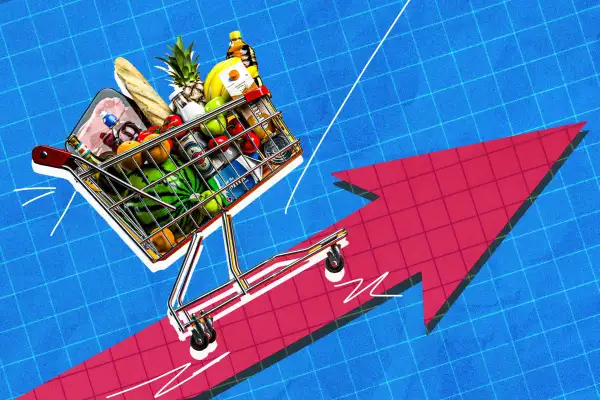Grocery Prices Are 'Never' Coming Down, Experts Say

Grocery store prices have soared more than 25% in the past five years, outpacing average wage growth. When will food prices finally come down? The answer could be never.
Food-at-home inflation is running at 2.7% year-over-year, according to the U.S. Bureau of Labor Statistics' consumer price index, or CPI. That's higher than all of last year, and the pain from the long stretch of inflation between 2020 and 2022 hasn't fully faded from the checkout line.
While it may feel like grocery prices have to budge eventually, economists say Americans may need to get used to higher prices at the store.
Will grocery prices ever come down?
Prices for individual items will inevitably fall. Meat and produce, for instance, tend to be volatile — think of the recent swings in avocado prices, which were up more than 20% year-over-year in February before falling below year-ago levels in the spring. And after skyrocketing earlier in the year, egg prices are down more than 40% from the peak in March.
But on the whole, grocery prices rarely come down.
"It’s quite likely prices, for the most part, will not come down at least in nominal terms," Professor Jean-Pierre Dubé at the University of Chicago Booth School of Business writes in an email.
The marketing professor is in agreement with Phil Lempert, a food industry analyst at SupermarketGuru, who recently told CBS News he's often asked when prices will fall. "My answer is simple: never," Lempert said.
Grocery stores and food suppliers are typically quick to pass cost increases along to consumers.
"That’s what happened in the past three years in response to shortages resulting from COVID lockdown and the disruption to global supply chains," Dubé explains.
"In theory, the for-profit firm would then also want to lower its shelf prices to consumers when costs go down. But the literature has found a surprising asymmetry. Firms quickly pass through cost increases, but not cost decreases."
In 2023, food manufacturers were accused of "profit taking," capitalizing on public awareness of supply-chain problems to hike prices.
"When the consumer knows (e.g., through the media) that costs are rising, it seems 'fair' for the firm to raise its price too. These opportunities arise very infrequently, so firms really take advantage," Dubé says.
"Companies are less responsive to cost decreases because they don’t know when the next opportunity will arise to raise their prices again."
What would it take for grocery prices to fall?
For one thing, trade policy under President Donald Trump is evolving, and tariff reversals or reductions could theoretically bring price relief for affected items like coffee. (Coffee leads all CPI categories with year-over-year inflation of 18.9%.)
"If the tariffs were to never have existed, or if they were to be walked back entirely, you would see some relief in terms of prices," Matt Colyar, an economist at Moody's Analytics, tells Money.
Don't count on that to happen, however. Even if the Supreme Court were to rule against the administration in the pending tariff case, the White House has other options to enact levies with other legal justifications, Colyar notes.
For grocery prices to actually drop, there'd likely have to be an unexpected shift in the market.
"Say, diesel prices, which are a key agricultural input, if they dropped to record lows, I think you'd see some pass-through to some goods that would be slightly cheaper," Colyar says.
"But in general, if you look at any price series for American food, or washers and dryers, or cars, generally, it's a trend of upward growth, and you really don't see backtracking or deflation all that often."
The best that consumers can probably hope for would be that wages increase faster than prices, allowing shoppers to regain purchasing power at the grocery store.
Advice from Money
Frustrated by the high prices at the grocery store? Don't let it discourage you so much that you revolt by going to Taco Bell for all your meals. Stick to your grocery shopping and cooking routines.
Making economical choices at the grocery store is one of the most important things you can do for your personal finances. Instead, let your price gripes motivate you to shop smarter.
From shopping in bulk at warehouse clubs to reducing food waste, there are too many strategies to save on groceries to name them all here. Try making one or two changes that feel doable, whether it's learning new recipes with low-cost ingredients or finally downloading your grocery store's coupon app.
You can also consider pivoting to alternatives if specific food items are severely inflated in price.
Currently, beef and veal prices (up 14.7% year-over-year) are leading all non-beverage food items for inflation, according to the CPI. Many shoppers are buying less meat, while others are relying more on proteins like chicken and pork, which remain more affordable than beef.
More from Money:
Best Credit Cards for Groceries of 2025
The 7 Most Popular Ways People Are Saving Money on Groceries Now
